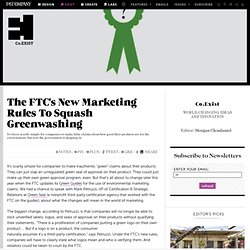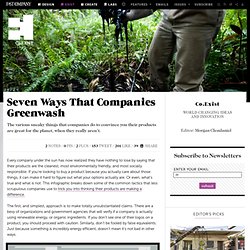

Coming Out - Bellastock le Grand Déballage. Exposition – Le Grand Détournement. The FTC's New Marketing Rules To Squash Greenwashing. It's scarily simple for companies to make inauthentic "green" claims about their products.

They can just slap an unregulated green seal of approval on their product. They could just make up their own green approval program, even. But that's all about to change later this year when the FTC updates its Green Guides for the use of environmental marketing claims. We had a chance to speak with Mark Petruzzi, VP of Certification & Strategic Relations at Green Seal (a nonprofit third-party certification agency that worked with the FTC on the guides), about what the changes will mean in the world of marketing. The biggest change, according to Petruzzi, is that companies will no longer be able to stick unverified labels, logos, and seals of approval on their products without qualifying their statements. Seven Ways That Companies Greenwash. Every company under the sun has now realized they have nothing to lose by saying that their products are the cleanest, most environmentally friendly, and most socially responsible.

If you’re looking to buy a product because you actually care about those things, it can make it hard to figure out what your options actually are. Or even, what’s true and what is not. This infographic breaks down some of the common tactics that less scrupulous companies use to trick you into thinking their products are making a difference. The first, and simplest, approach is to make totally unsubstantiated claims. There are a bevy of organizations and government agencies that will verify if a company is actually using renewable energy, or organic ingredients. GRAND PRIX.